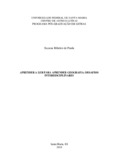| dc.creator | Paula, Suzana Ribeiro de | |
| dc.date.accessioned | 2018-09-18T18:08:05Z | |
| dc.date.available | 2018-09-18T18:08:05Z | |
| dc.date.issued | 2018-02-27 | |
| dc.identifier.uri | http://repositorio.ufsm.br/handle/1/14345 | |
| dc.description.abstract | This Master's research aims to investigate the geography field, specifically the recurrent
genres in this discipline in its compositional, linguistic and semantic-discursive aspects.
Therefore, we start from the conception that the genders are configurations of meaning with a
social purpose (ROSE; MARTIN, 2012). Martin points out that writing in science is different
from writing in other parts of the curriculum. Thus, "being literate in science means
understanding the technical language that is used"(MARTIN, 1993b, p. 186). In this sense, we
can say that textbooks constitute scientific models of written language for students. Due to
this, we understand that the reading and the writing in the basic education can be improved if
the professor gives the pupils an explicit education of the act of reading and writing, whereas
the particularities of each discipline. This research is placed in the qualitative and quantitative
paradigm; therefore, it is necessary to quantify the linguistic resources that characterize the
sorts to interpret them. This way, the emphasis is in the qualitative interpretation of the
researcher that finds subsidies in the quantification of the linguistic elements. We select, as
general analysis, the didactic book of Geography Araribá Project, 2010, of 6º and 9º year -
published by Modern Editor, with Fernando Carlo Vedovate as responsible. The analysis
contemplates two stages: i) contextual investigation of the didactic book of Geography, with
focus in the PNLD; and ii) literal-discursive investigation, focusing the variable of the
context, the lexicon-grammatical characteristics and semantic-discursive (HALLIDAY and
MATTHIESSEN, 2014) and the taxonomy proposed by the Functional Systemic Linguistics
and thematic structure (MARTIN, ROSE, 2008), (MOYANO, 2013b). From the analysis of
the data, it was concluded that the family of recurrent sorts is of the Reports and the
Explanations.The Descriptive,Classified and Compositional Reports classify a phenomenon
and describe its characteristics, whose intention is “to say what it is” and “as it is”.
Explanations of the factorial and consequential type contribute to evidence the causes and
consequences of the phenomena. The purpose of the Explanations is to say "how" and "why"
phenomena happen. The Stages and Phases that make up the genres fulfill their purpose and
contribute to reach the goal of the analyzed units. | eng |
| dc.language | por | por |
| dc.publisher | Universidade Federal de Santa Maria | por |
| dc.rights | Attribution-NonCommercial-NoDerivatives 4.0 International | * |
| dc.rights.uri | http://creativecommons.org/licenses/by-nc-nd/4.0/ | * |
| dc.subject | Leitura | por |
| dc.subject | Gêneros textuais | por |
| dc.subject | Linguística sistêmico-funcional | por |
| dc.subject | Geografia | por |
| dc.subject | Reading | eng |
| dc.subject | Text genres | eng |
| dc.subject | Systemic-functional linguistics | eng |
| dc.subject | Geography | eng |
| dc.title | Aprender a ler para aprender geografia: desafios interdisciplinares | por |
| dc.title.alternative | Learning to read to learn geography interdisciplinary challenges | eng |
| dc.type | Dissertação | por |
| dc.description.resumo | Esta pesquisa de Mestrado tem por objetivo investigar área da geografia, mais
especificamente, os gêneros recorrentes nessa disciplina em seus aspectos composicionais,
linguísticos e semântico-discursivos. Para tanto, partimos da concepção de que os gêneros são
configurações de significado com um propósito social (ROSE; MARTIN, 2012). Martin
sinaliza que a escrita na ciência é diferente da escrita em outras partes do currículo. Desse
modo, “ser alfabetizado em ciência significa entender a linguagem técnica que é usada”
(MARTIN, 1993b, p. 186). Nesse sentido, podemos afirmar que os livros didáticos se
constituem como modelos científicos da linguagem escrita para os alunos. Em razão disso,
entendemos que a leitura e a escrita na educação básica podem ser aprimoradas se o professor
oportunizar aos alunos um ensino explícito do ato de ler e de escrever, considerando as
particularidades de cada disciplina. Esta pesquisa se situa no paradigma qualitativo e
quantitativo, pois há necessidade de quantificar os recursos linguísticos que caracterizam os
gêneros para interpretá-los. Dessa forma, a ênfase se encontra na interpretação qualitativa do
pesquisador que encontra subsídios na quantificação dos elementos linguísticos.
Selecionamos como universo de análise o livro didático de Geografia Projeto Araribá, 2010,
do 6º e 9º ano - publicado pela Editora Moderna, tendo como responsável Fernando Carlo
Vedovate. A análise contempla duas etapas: i) investigação contextual do livro didático de
Geografia, com foco no PNLD; e ii) investigação textual-discursiva, focalizando as variáveis
do contexto, as características léxico-gramaticais e semântico-discursivas (HALLIDAY;
MATTHIESSEN, 2014) e a taxonomia proposta pela Linguística Sistêmico-Funcional e
estrutura temática (MARTIN, ROSE, 2008), (MOYANO, 2013b).A partir da análise dos
dados, conclui-se que a Família de gêneros recorrentes é a dos Relatórios e das Explicações.
Os Relatórios Descritivos, Classificativos e Composicionais classificam um fenômeno e
descrevem suas características, cujo propósito é “dizer o que é” e “como é”. As Explicações
do tipo fatorial e consequencial contribuem para evidenciar as causas e consequências dos
fenômenos. O propósito das Explicações é dizer “como” e “por que” os fenômenos
acontecem. As Etapas e Fases que compõem os gêneros concretizam o seu propósito e
contribuem para alcançar a meta das Unidades analisadas. | por |
| dc.contributor.advisor1 | Pinton, Francieli Matzenbacher | |
| dc.contributor.advisor1Lattes | http://lattes.cnpq.br/1979338178408389 | por |
| dc.contributor.referee1 | Andreis, Adriana Maria | |
| dc.contributor.referee1Lattes | http://lattes.cnpq.br/8472948314997700 | por |
| dc.contributor.referee2 | Cabral, Sara Regina Scotta | |
| dc.contributor.referee2Lattes | http://lattes.cnpq.br/9037816308995897 | por |
| dc.creator.Lattes | http://lattes.cnpq.br/7830102440018989 | por |
| dc.publisher.country | Brasil | por |
| dc.publisher.department | Letras | por |
| dc.publisher.initials | UFSM | por |
| dc.publisher.program | Programa de Pós-Graduação em Letras | por |
| dc.subject.cnpq | CNPQ::LINGUISTICA, LETRAS E ARTES::LETRAS | por |
| dc.publisher.unidade | Centro de Artes e Letras | por |



